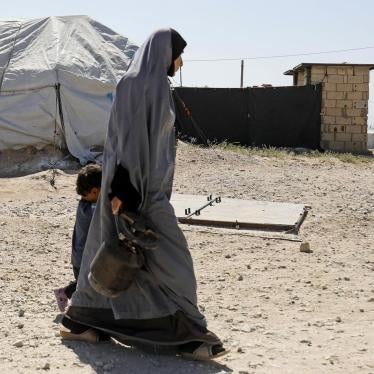(New York) – The conviction and four-year sentence of Xu Zhiyong, one of China’s preeminent rights advocates, for “gathering crowds to disturb social order” is a pretext to chill popular protests against corruption, Human Rights Watch said today.
News of the trial has been censored, as has reporting by foreign media on how relatives of top leaders keep offshore accounts to hold unexplained wealth.
Xu, age 40, became prominent for his role in organizing nonviolent protests against corruption and discrimination in education under the banner of the New Citizens Movement. Chinese courts have tried two other activists in the New Citizens Movement in the past week, including Zhao Changqing and Hou Xin. Ding Jiaxi, Li Wei, Yuan Dong and Zhang Baocheng are scheduled to be tried on January 27.
Three others were tried in December but no verdict has yet been released.
“The harsh sentence for a moderate critic who reflected widespread public concern about corruption shows just how little tolerance there is towards dissent in China today,” said Brad Adams, Asia Director. “Xi Jinping has made fighting corruption the linchpin of his presidency, but when an average citizen takes up the same cause, he is sent to prison. This hypocrisy makes a mockery of the president’s anti-corruption campaign.”
China placed Xu under house arrest in April 2013. Police took him into custody on July 16 and formally arrested him on August 2. The police transferred Xu’s case to the procuratorate on December 4.
Xu’s trial at Beijing No.1 Intermediate People’s Court began on January 22, 2014, and was based on charges that Xu had “organized” and “incited” disruptions in front of the Ministry of Education and other locations. The charges said that protestors had “defied and obstructed” officers in charge of public safety trying to carry out their duties. The charges claim protesters “unfurled banners, made a racket” and created “serious chaos.” Because “the circumstances are serious” and he was a “ringleader,” Xu was given a four-year sentence out of a maximum of five.
At his trial only two family members were allowed to attend the hearing in a very small courtroom. No journalists were allowed in. A group of foreign diplomats were able to enter the court building but were not allowed to attend the hearing.
In protest at the unfair proceedings, Xu and his lawyer stayed silent throughout the trial. Xu made a closing statement, but he was interrupted ten minutes into reading it. Outside the court, Xu’s supporters were taken away and briefly detained while foreign journalists were manhandled by the police.
In November 2013, the Supreme People’s Court issued a document instructing courts to take steps to reduce miscarriages of justice. Courts must not make judgments because of “pressure to maintain stability,” ensure trials are open to the public, and ensure the defense has the right to cross-examine witnesses. The conduct of Xu’s trial suggests these instructions were overridden.
“How can the Chinese public gain faith in the courts when they deny the accused the most basic of fair trial rights, such as a public hearing or the ability to call witnesses?” Adams said.
The cases against New Citizens Movement members and other peaceful critics are part of one of the largest crackdowns against activists in recent years. In the past year, the Chinese government has waged a campaign against “online rumors,” punished outspoken citizens and journalists for blowing the whistle on corruption, and expanded the scope of what it regards as threats to national security such as internet and unspecified “cultural threats.”
“Instead of ‘putting power’ within a ‘cage of regulations’, as Xi Jinping has promised, the new leadership appears to be more interested in consolidating power,” Adams said. “Staging show trials of critics is wholly at odds with Xi’s self-proclaimed reformist agenda.”






